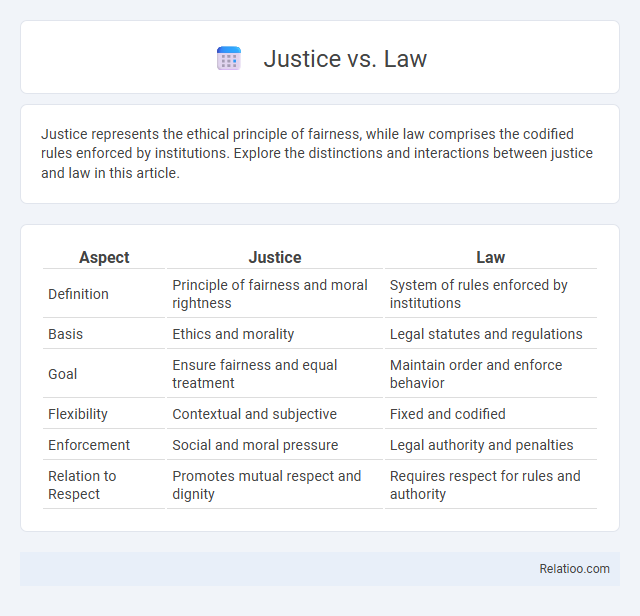Justice represents the ethical principle of fairness, while law comprises the codified rules enforced by institutions. Explore the distinctions and interactions between justice and law in this article.
Table of Comparison
| Aspect | Justice | Law |
|---|---|---|
| Definition | Principle of fairness and moral rightness | System of rules enforced by institutions |
| Basis | Ethics and morality | Legal statutes and regulations |
| Goal | Ensure fairness and equal treatment | Maintain order and enforce behavior |
| Flexibility | Contextual and subjective | Fixed and codified |
| Enforcement | Social and moral pressure | Legal authority and penalties |
| Relation to Respect | Promotes mutual respect and dignity | Requires respect for rules and authority |
Defining Justice and Law
Justice represents the principle of fairness and moral rightness, guiding society's determination of what is ethical and equitable. Law consists of the formal rules and regulations enacted by governments to maintain order and protect rights. Understanding the distinction helps you recognize that while laws are structured frameworks, justice aspires to uphold broader ethical standards beyond legal statutes.
Historical Perspectives on Justice and Law
Historical perspectives on justice and law reveal their intertwined evolution, with justice representing moral fairness and law embodying codified rules governing society. Ancient civilizations like Mesopotamia and Greece laid foundational legal codes, such as Hammurabi's Code and Aristotelian theories, highlighting justice as an ethical ideal influencing legal structures. Your understanding of justice versus law benefits from recognizing how historical contexts shaped legal systems to enforce societal norms while aspiring to uphold equitable principles.
Philosophical Foundations of Justice
Justice represents the moral principle of fairness and equity, rooted in philosophical theories such as Aristotle's concept of distributive justice and Rawls' theory of justice as fairness. Law comprises the system of rules enacted and enforced by institutions to regulate behavior, reflecting but not always embodying philosophical ideals of justice. Your understanding of justice deepens when recognizing its foundation in ethical reasoning, distinguishing it from the often pragmatic and procedural nature of law.
The Role of Law in Society
Law establishes the structured rules and regulations that maintain order, resolve disputes, and protect individual rights within society. It serves as the formal mechanism through which justice is pursued, ensuring fairness and accountability in social interactions. Your understanding of law underscores its crucial role in balancing societal interests and upholding justice.
Justice and Law: Key Differences
Justice represents the moral principle of fairness and equity in human interactions, whereas law consists of formal rules established and enforced by governing authorities to regulate behavior. Your pursuit of justice often involves interpreting laws in ways that uphold ethical standards beyond mere legal compliance. Understanding the key differences between justice and law helps clarify how legal systems strive to balance societal order with individual rights.
When Law Conflicts with Justice
When law conflicts with justice, legal statutes may uphold decisions that contradict ethical fairness or human rights principles, leading to societal tension and moral dilemmas. Historical examples such as segregation laws highlight situations where legal compliance undermines justice, prompting calls for reform and civil disobedience. Understanding the distinction between law as codified rules and justice as moral rightness is crucial for evaluating legal systems and advocating for equitable policies.
Real-World Examples of Justice vs Law
Justice embodies fairness and moral rightness, while law consists of codified rules enforced by institutions, and equity ensures individualized fairness within legal frameworks. Your experience in a workplace discrimination case may highlight justice when moral fairness demands more than strict legal interpretations. For instance, in landmark cases like Brown v. Board of Education, the law was amended to reflect justice by abolishing racial segregation, demonstrating how justice can drive legal reforms.
The Impact of Culture on Justice and Law
Cultural values deeply influence the interpretation and application of both justice and law, shaping societal norms and legal frameworks. Justice often reflects the moral and ethical standards of a culture, while law serves as a formal system designed to enforce those cultural principles. Divergences in cultural perspectives can result in varying legal practices and concepts of fairness, highlighting the complex relationship between culture, justice, and law.
Pursuing Justice Through Legal Reform
Pursuing justice through legal reform involves addressing gaps and inequalities within existing laws to ensure fairness and equity for all individuals. Your efforts to promote justice require transforming legal systems that often prioritize rigid interpretations of law over moral and social equity. Emphasizing justice in legal reform ensures laws serve the broader societal good by protecting rights, correcting injustices, and fostering trust in legal institutions.
The Future Relationship of Justice and Law
The future relationship of justice and law will increasingly depend on the integration of ethical principles into legal frameworks, ensuring that laws not only enforce order but also promote fairness and equity. Advancements in technology and artificial intelligence will influence how justice is administered, potentially reducing biases and increasing transparency in legal processes. Your understanding of these evolving dynamics can empower you to advocate for a justice system that balances strict legal adherence with compassionate societal values.

Infographic: Justice vs Law
 relatioo.com
relatioo.com